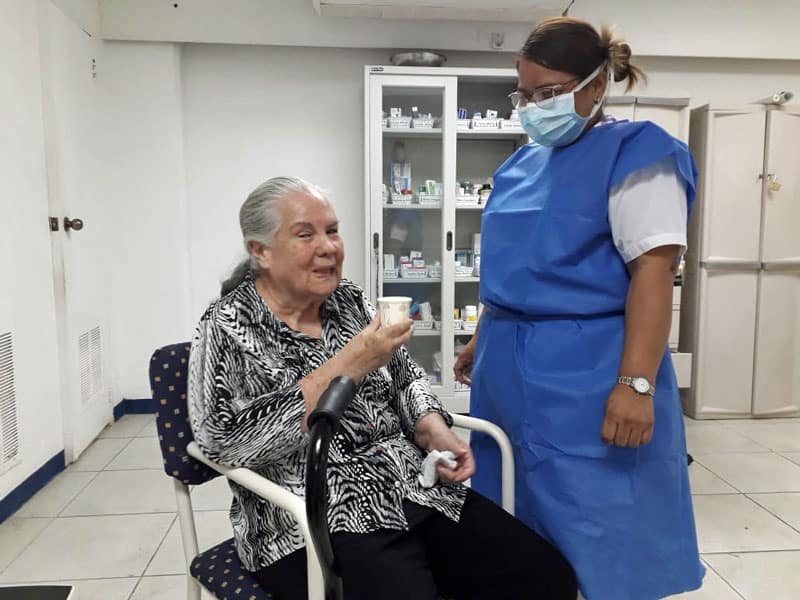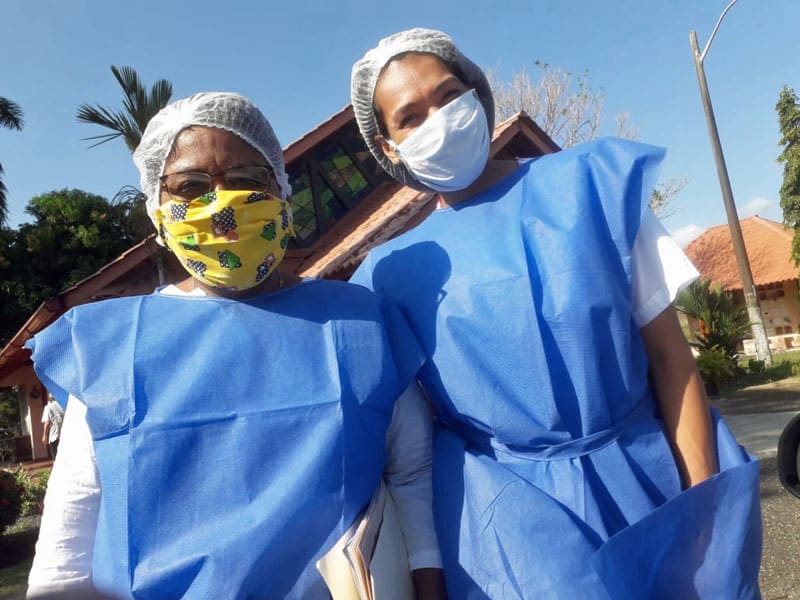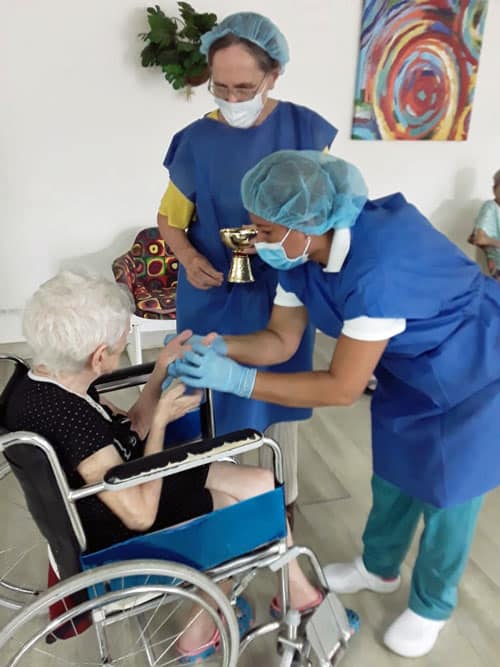WEB-ONLY FEATURE:
The spirit of solidarity among caretakers, residents and families brings hope to an elder care residence in Panama
As the COVID-19 virus continues to devastate the world, one resident at an elder care home in Panama shared a Resurrection message for this Easter season. “We are praying a lot for the world and Panama,” said Gloria Paz Rodriguez. “We have faith and hope that they can find a cure soon.”
That spirit of optimism seems to be contagious at Fundación Nueva Vida (New Life Foundation) despite the threat of COVID-19. Amid the pandemic, Maryknoll Sister Geraldine Brake and a 34-person staff are committed to making sure their elderly residents continue to have quality of life.
“We are a small capsule of what is happening in hospitals and other residences for the elderly,” Sister Brake says. “All these places are considered a high priority.”

Gloria Paz Rodriguez, a longtime resident of Fundación Nueva Vida, receives medication from one of the elder care residence’s aides. (Courtesy of Geraldine Brake/Panama)
Sister Brake’s team has reworked their schedules and extended their shifts so they can ensure the best possible care for the 78 elderly residents here. As in many elder care facilities, hygiene measures have doubled and visitors have been forbidden.
Some residents—especially those used to seeing their families weekly—were initially disappointed with the visitor restriction, but they have come to understand that the measure is necessary. “It’s like their way of collaborating,” Sister Brake says of the residents. “They miss their families but realize (seeing them) is not possible right now. It’s a sacrifice. Everyone has a sacrifice to offer.”
As of April 14, Panama, a country of 4 million people, reported over 3,500 confirmed cases of the virus. So far, there have been 95 deaths nationwide. The country implemented early testing, temporarily closed borders, and imposed a curfew and strict social distancing measures. Panama has also prepared the health system for an influx of cases and approved the building of a new hospital to treat patients.
“As the situation continues, we will continue to follow directives of the government,” Sister Brake says, citing the televised briefings that she and the residents watch daily.

Caretakers at Fundación Nueva Vida, a residence for the elderly in Panama, are taking precautions to ensure the health of their residents amid the coronavirus pandemic. (Courtesy of Geraldine Brake/Panama)
The residents who are aware of the situation are concerned about their families and homeland, Sister Brake adds. Still, they realize that Panama is not as impacted as other countries, says the missioner, who has spent nearly 30 years ministering to the elderly in Panama.
The residents’ families are also collaborating as much as they can. Although forbidden to visit, many relatives and volunteers from the community come to help disinfect the buildings.
“They are not seeing their relatives but are willing to help us with the extra cleaning of chairs or tables when the residents are in their rooms,” Sister Brake explains.
The residents, she says, range in age from 64 to 101 years old, and many have pre-existing health conditions that could make them vulnerable, so sanitary conditions are of utmost importance.
The staff has also adopted stricter hygiene protocols, such as changing their shoes and clothes when they come to work, disinfecting areas more often and hand washing, says Beatriz Grando, the home’s administrator. “No precaution is too little to prevent contamination,” Grando says.
Sister Brake says the employees’ attitude inspires her. “The staff’s willingness to make adjustments personally and in their families is a real blessing,” she says. She cites their willingness to work 16-hour shifts with only a day off in between so they can continue providing residents with 24/7 care while respecting the government’s curfew, which initially was set from 5 p.m. until 5 a.m. and was later extended. People working at places like elder care facilities were able to receive special permission to move about Panama during the curfew.
Many of the aides who care for the residents—changing them, giving them baths and feeding them—have opted to stay in the apartments on campus to avoid the risk of using public transportation to go home.
Grando says the residents keep thanking the staff for their efforts, and “we try to make sure the team knows they are appreciated.”

Sister Geraldine Brake and one of the aides at Fundación Nueva Vida in Panama give the consecrated host to one of the elderly residents during a prayer service during Holy Week. (Courtesy of Geraldine Brake/Panama)
Residents continue with their morning prayer, physical therapy and activities like bingo and movies while observing social distancing measures. “We have our routines; the time to pray the rosary is even more important now. Residents pray for health around the world,” Sister Brake says, adding that even though liturgical celebrations have had to be restricted, the faith of the residents has strengthened.
The missioner is grateful to the many families who are donating medicines, vegetables, cleaning supplies, masks and hospital gowns. “One of the things this crisis has made us realize is how fragile we are and how we need the solidarity of others,” Grando says, adding that the donated supplies help the Fundación to keep the residents healthy.
“Without this spirit of solidarity and unity, we would not be calm to face this frightening pandemic,” says Gloria Paz Rodriguez.
Featured image: Fundación Nueva Vida, a residence housing 78 older men and women in Panama, has adapted to continue to give its residents quality of life amid the coronavirus pandemic. (Courtesy of Geraldine Brake/Panama)

